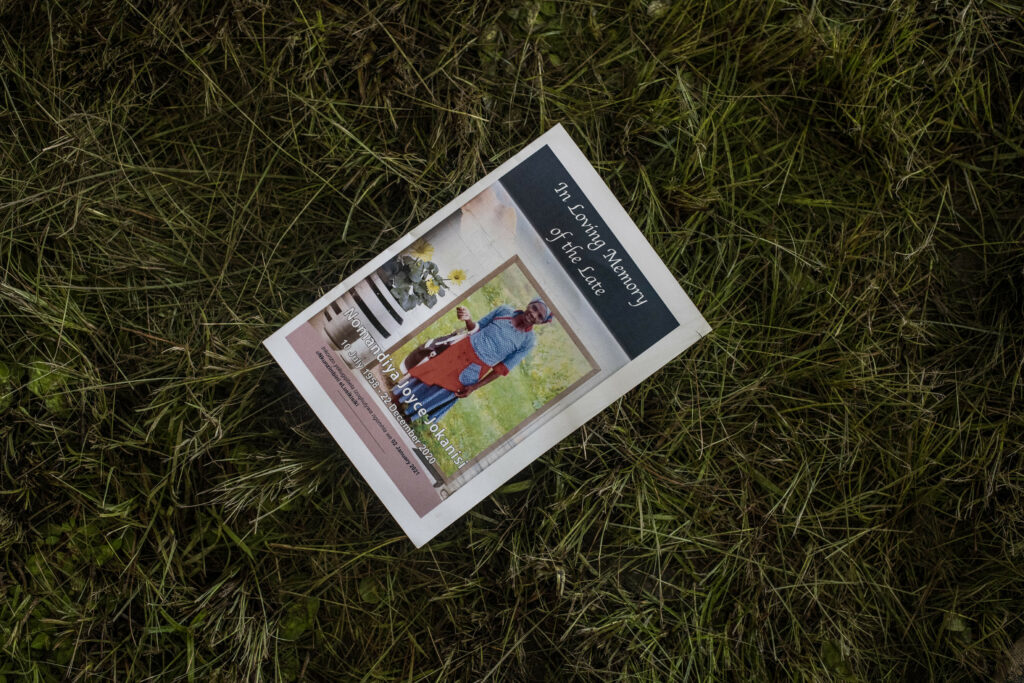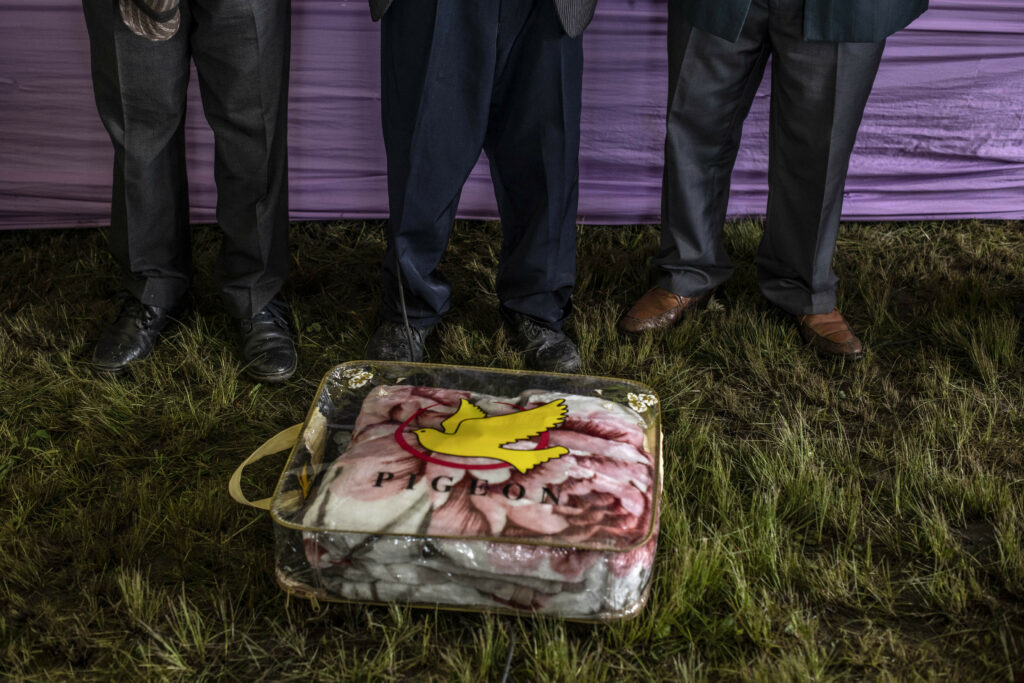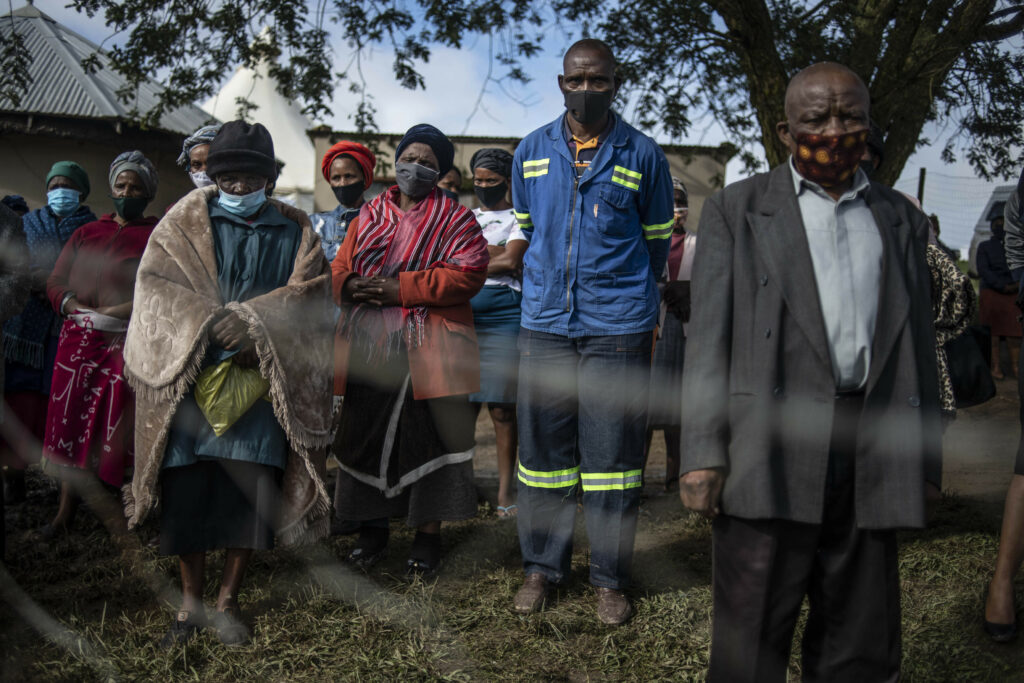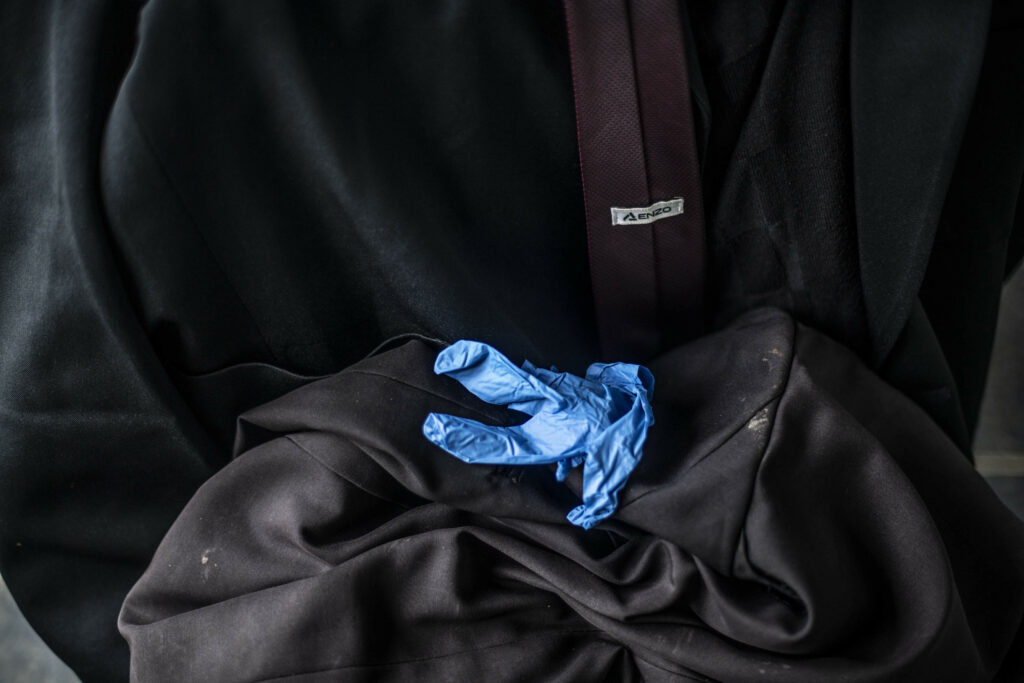A funeral parlour worker covers the face of Nomandiya Joyce Jokanisi in Lusikisiki. She was the mother of Semi Jokanisi, a miner killed at Marikana. She passed away after suffering a stroke. Funeral organisers have taken special precautions to ensure the safety of mourners.
It is challenging to keep the funeral of Joyce Jokanisi down to just 50 people. The diminutive 67-year-old’s selflessness and fortitude had carved her out as a pillar in the Eastern Cape town of Lusikisiki and her community wants to ensure a deserving send-off.
Despite possessing the shoulders of a wire coat-hanger, Jokanisi was a Pondoland Atlas. Neighbours and relatives came to her for advice and assistance; she worked with feverish zeal at other families’ funerals, rituals and ceremonies; when someone needed a favour from her husband, the more aloof Goodman Jokanisi, they usually went through Joyce.
She also kept her brood of children and grandchildren on the straight and narrow — disciplining and inspiring them.
Ma’Jokanisi was compelled to do this because she carried the world on her back.
The Marikana massacre took her son
Semi, her eldest son, was 29 years old in 2012 when he was killed by police three days before their massacre of 34 striking mineworkers at the Lonmin (now Sibanye-Stillwater) platinum-mining operation in Marikana in the North West.
He died in a skirmish between mineworkers and police, which had been started, without provocation, by the men in blue. When the dust settled, two other striking mineworkers and two police officers were dead.
There was no evidence linking Semi to the deaths of warrant officers Sello Ronnie Lepaaku and Hendrick Tsietsi Moenene. Jokanisi’s body had, in fact, been found in a field away from the melee and too far away from the fallen policemen for him to have been involved in a face-off with them. One of the bullets that killed Semi had lodged in his spine, incapacitating him immediately.
If, in his final acts, Semi had been the dutiful son of the previous years of his life, he would have been heeding his father’s advice and not confronting the police.
Goodman Jokanisi, a mineworker since 1980, had shared living quarters with Semi, as they both worked different shifts at the mine’s Karee Four shaft.
The elder Jokanisi had been on leave when workers at Lonmin downed tools, but had advised his son over the phone: “It’s hard not to be involved in the strike, but when you are there you must not go to the front, and you should remain neutral.”
Father and son pooled their incomes from Lonmin to care for Semi’s seven siblings and his own five minor children.
The unmarried Semi was an aesthete with expensive tastes. He was also a charmer. The girls loved him, and his mother would forgive her son anything.
When Ma’Jokanisi heard the news of Semi’s death, she fainted. Her body refused to accept food for weeks. Diagnosed with depression, Ma’Jokanisi was prescribed medication, which she took until her death from a stroke a few days after Christmas 2020.

After her son’s death, she complained of chest pains and suffered heartache. No policeman has been convicted for killing her son.
The only policeman charged for Semi Jokanisi’s death was former North West deputy provincial police commissioner, Major General William Mpembe. He had ordered the firing of tear-gas and stun grenades that triggered the violence on 13 August.
https://mg.co.za/news/2020-10-16-marikana-murder-trial-resumes/
Until that point, police under Mpembe’s command had been peacefully escorting the mineworkers — armed with traditional weapons commonplace in mining strikes — back to the koppie where they had congregated daily.
Mpembe is currently standing trial with five other police officers who are charged with the murder of mineworker Phumzile Sokanyile on 13 August. The hearings have been affected by the coronavirus pandemic; already long-running and ponderous, the case will stretch into 2021, perhaps further, because of adjournments.
Ma’Jokanisi died without knowing who killed her son. Without knowing justice.
Losing a grandson
In January 2016, on the second day of the new school year, Ma’Jokanisi’s grandson Ayabonga Qekeka, Semi’s son, walked out the gates of the Kokstad boarding establishment he was enrolled at and committed suicide. He was 15.
Ayabonga had complained of being bullied by some children and teachers because of his size and his father’s involvement at Marikana. School staff members who spoke to the Mail & Guardian five years ago claimed to not know about the bullying.
Ma’Jokanisi had her first stroke after she buried her grandson. During the funeral, she had been in constant motion to ensure a seamless ceremony.
Joyce Jokanisi had lived carrying the world on her back. Her husband was a migrant worker, whom she saw two to three times a year. In his absence, she raised their family, keeping it together in their rural home. Her descendants, like their ancestors, suffered violence and injustice while alive — they died because of these assaults on their humanity. She took pills to alleviate her depression. She took pills to sleep at night.

Despite a pledge from President Cyril Ramaphosa, who was a non-executive director at Lonmin in 2012, she never received an apology from the state for it having killed her son. While she felt the chances of obtaining justice for Semi, and Ayabonga, recede further every day, Joyce Jokanisi continued to live with the hope that her grandchildren would never work underground. That they would lead better lives than the generations before them.
The fight that would not be extinguished
“She was a fighter,” says her grandson, Ndikho Bomela, another of Semi’s sons, who is now 18. “After my father’s death, she was never the same. She always had health problems, but she filled his role for us — she was our father.”
Joyce Jokanisi pushed and cajoled her grandchildren to do well at school, to ensure their “father’s blood was not spilled in vain”.
“Last year, my younger brother had complained to her that he was being bullied at school. He had told me nothing, even though I was on the school’s prefects’ disciplinary committee, but he called her instead, at around midnight. Just after two o’clock that morning I got a call from the security guard saying my grandmother was at the school gate,” says Ndikho, the memory adding a lightness to his voice.
Protective of her family, worried about a repeat of what had happened with Ayabonga, Ma’Jokanisi had got off the phone with her grandchild and immediately insisted on being driven from Lusikisiki to the children’s boarding school in Port Edward — a two-and-a-half-hour car ride away.
“She had to be calmed down and convinced to talk to the teachers in the morning, not right there and then. She put the whole school on hold the next day,” Ndikho remembers with a chuckle.
A send off for a Titan
Ma’Jokanisi had an open heart, and people loved and respected her for it. So they came to pay their last respects on 2 January.
Neighbours and relatives gathered at the funeral with circumspection. Many did not enter the Jokanisis’ yard to hear the eulogies, rather hanging along the wire fence or across the road; their lingering presence marking their respect.

Contrary to the government’s Covid-19 prescription of a maximum of 50 people allowed to attend funerals, there were a few more in the yard and tent. But the tent was open, increasing ventilation. Seating was spaced out and limited, and everyone wore a mask. There were no scrums of the type that angered South Africans when ANC party leaders gathered to mourn the death of struggle stalwart Andrew Mlangeni in July last year.
“People had to come and say goodbye to her, and we didn’t know how to tell some people that they must stay, and others that they must go,” says Ndikho Bomela, “so we took as many precautions as we could.”
So often criticised and talked down to by “do as we say, not as we do” politicians for allegedly flouting Covid regulations and spreading the coronavirus, Jokanisi’s funeral was an example of ordinary rural South Africans policing themselves effectively.

Family members moved around the tent squirting sanitising liquid into people’s hands every five minutes. When one man in the tent removed his mask to complete a point he was making to a socially distant neighbour, he was quickly shamed into replacing it by people around him.
People were respectful of each others’ space and wary of death. They had to be. South Africa is in the middle of a fearsome second wave of Covid-19. Two days earlier, on New Year’s Eve, 18 000 new infections in the country were recorded by Johns Hopkins University. There were 436 deaths. A week later, on 8 January, the country’s daily infections stood at 21 980, with 616 deaths in that 24-hour cycle.
In a world turned upside-down, funerals too have been upended. The all-night vigil that precedes Eastern Cape funerals was cut short at 8pm the previous night, with Joyce Jokanisi’s body — still stored at the mortuary — absent.
Viewing of her body did not take place at the funeral service, but at the parlour itself at 6am on the morning of the burial. Only close family and friends were present to view the body through a perspex dividing screen.

Then Ma’Jokanisi’s body was transported to her home just outside Lusikisiki, off the R61 towards Port St Johns. Rather than lying in honour while rituals were performed and words spoken, she was quickly buried, next to her son, Semi. Only then did the eulogies begin. Blankets were presented to Joyce Jokanisi’s four grandchildren — a symbol of the comfort and protection that other families have pledged to replace that of a grandmother who was also a father.
https://mg.co.za/news/2021-01-15-%e2%80%8bno-apology-or-comfort-as-another-marikana-mother-dies-without-justice/